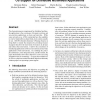Free Online Productivity Tools
i2Speak
i2Symbol
i2OCR
iTex2Img
iWeb2Print
iWeb2Shot
i2Type
iPdf2Split
iPdf2Merge
i2Bopomofo
i2Arabic
i2Style
i2Image
i2PDF
iLatex2Rtf
Sci2ools
124
click to vote
SIGOPSE
1998
ACM
1998
ACM
DROPS: OS support for distributed multimedia applications
The characterising new requirement for distributed multimedia applications is the coexistence of dynamic real-time and non-real-time applications on hosts and networks. While some networks (e.g., ATM) in principle have the capability to reserve bandwidth on shared links, host systems usually do not. DROPS (Dresden Real-time OPerating System) is being built to remedy that situation by providing resource managers that allow the reservation of resources in advance and enforce that reservations. It allows the coexistence of timesharing applications (with no reservations) and real-time applications (with reservations). By outlining the principle architecture, some design decisions, and first results, the paper demonstrates how these objectives can be met using straightforward OS technology. It argues that middleware for diverse platforms cannot meet these objectives efficiently without proper core operating system support.
Related Content
| Added | 05 Aug 2010 |
| Updated | 05 Aug 2010 |
| Type | Conference |
| Year | 1998 |
| Where | SIGOPSE |
| Authors | Hermann Härtig, Robert Baumgartl, Martin Borriss, Claude-Joachim Hamann, Michael Hohmuth, Frank Mehnert, Lars Reuther, Sebastian Schönberg, Jean Wolter |
Comments (0)

